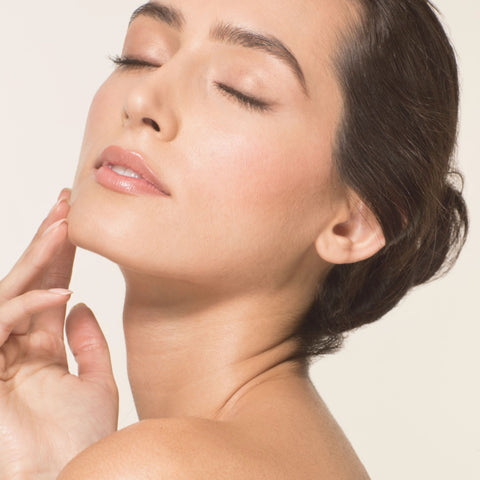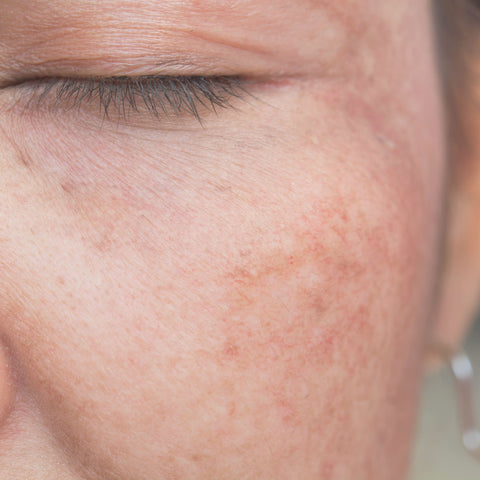
.png)
Despite being in lockdown, we hope you’re still soaking up your Vitamin D! Whilst Vitamin D is important for regulating calcium and phosphate in the body, and boosting a healthy immune system, it’s also important to balance your sun time with skin protection. Along with wearing a hat and staying in shaded areas during peak sun times, wearing an SPF is crucial.
First, let’s take a look at the facts regarding SPF:
SPF refers to ‘sun protection factor’, so for example, we generally have 15+, 30+ and 50+ available here in Australia. These numbers are in relation to the amount of time it takes your skin to turn red. Essentially, if your skin takes 5 minutes to go red, a 15+ SPF will give you 15 times longer before your skin begins to burn, or an additional 75 minutes. A 30+ SPF will give you 30 times longer, or an additional 150 minutes.

Physical:
Physical sunscreens create a physical barrier between the sun and your skin. These are ideal for sensitive skin and children.
Physical sunscreen, such as zincs, allows UV rays to bounce off your skin, prohibiting it from penetrating into the deeper layers (dermis), slowing down ageing.
Pros:
Cons:
Ingredients to look for: Zinc Oxide, Titanium Dioxide
Chemical:
Chemical Sunscreens penetrate the epidermis and dermis within the skin, using chemical compounds within the skin along with on the surface to absorb the sun’s rays before they can penetrate the dermis and as a result, damage your precious skin!
Pros:
Cons:
If you’re going to be photographed - It’s a myth that all sunscreens will cause ‘flashback’ in your photos on a balmy afternoon. Opt for a chemical based SPF (not Zinc). This will not flash-back and will still protect your skin!
If you have sensitive skin - Try a mineral or a zinc-based sunscreen.
If you’re active - Enjoy a daily run in the sunshine or swimming in the beach? Opt for a physical/zinc based sunscreen to avoid burning.
If you’re pregnant - Opt for a physical sunscreen. For the pregnant ladies out there, we know how much your baby’s health, along with your skin matters. Firstly, don’t stop wearing sunscreen all together - pregnancy hormones can cause pigmentation (chloasma) so protecting your skin from sun damage as much as possible will help control that. Secondly, make sure your SPF doesn’t list oxybenzone in its ingredients. This chemical that absorbs into your skin has been linked to low birth weights and can interfere with the body’s hormones, so it’s best to avoid it.
Also, don’t forget about your lips!
Lips can also experience sun damage. Look out for a lip balm that contains SPF to truly nourish your lips during the warmer months. An SPF can also help to heal cracks and redness in your lips.

If you’re already experiencing sun damage, here are some products and treatments we recommend.
Treatments
Lactic Peels
A lactic peel can truly work wonders! They work by exfoliating the top layers of your skin, evening out your skin tone, intensely hydrating the skin and allowing the absorption of future ingredients to penetrate more effectively. Lactic peels are the ultimate in-between treatment to prepare the skin for a more in-depth peel by stimulating its regenerative and healing properties.
Vitamin A Treatment/Peels
A Vitamin A treatment or peel is a real game changer! We like to call it the “power peel”, as it delivers incredible results quickly. These treatments are potent with retinol and lactic acid. Your skin will shed to a renewed appearance. They also stimulate collagen and elastin production, along with boosting cell turnover to visibly reduce pigmentation as well as the signs of ageing.
IPL
This is an excellent choice for sun damage. Light energy penetrates below the skin's surface, where the unwanted pigment (melanin) lives. The pigment works its way up to the surface and forms a crust which flakes off in about 1 week.
Products
Cosmedix Simply Brilliant Brightening Serum
Aspect Dr Complete Pigment Plus Serum
Cosmedix Define, Aspect Retinol Brulee or Aspect Dr Exfol A Plus Serum
The best ways to treat your sunburn straight away are:
If you’re by a pool, take a quick dip to cool your body and then get away from the sun. If not, use cold compresses to cool your body.
Moisturise your skin while it's damp. Use a gentle moisturiser - avoid petroleum or oil-based products.
Burn draws the skin's fluid to the surface and away from the rest of your body, therefore dehydrating you. Make sure you replenish your body by drinking plenty of water, and even trying a sports drink to boost your electrolytes.
Want to find out more about your skin than what's on the surface? Book a skin analysis appointment by clicking here.

